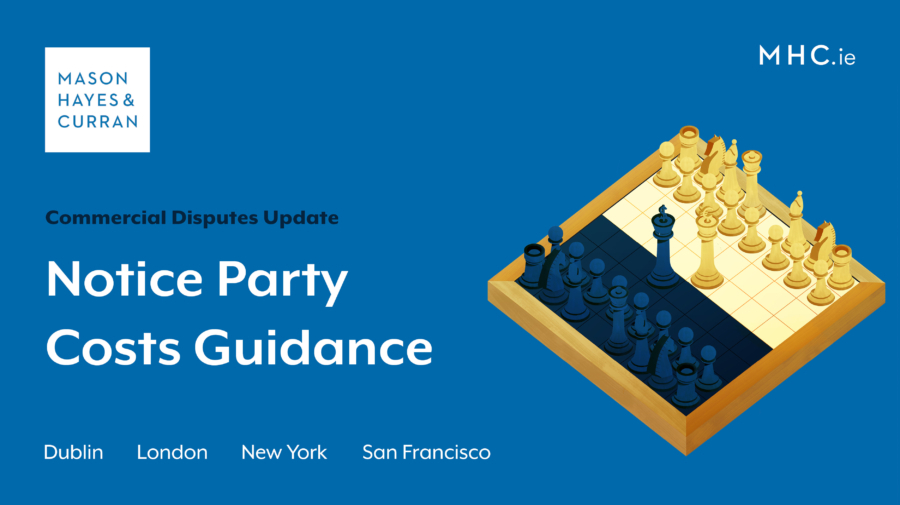Notice Party Costs Guidance

The High Court has recently given guidance on the law relating to whether, and in what circumstances, a notice party in a case is entitled to its costs. In doing so, it summarised and applied relevant previous judgments, as well as making some more general observations regarding costs applications. Commercial Disputes partners, Gearoid Carey and Gerard Kelly look at the facts in this case and examine the scope of the Court’s ruling.
A recent High Court costs ruling has specifically addressed the question as to whether, and in what circumstances, a notice party to proceedings should be entitled to make an application to court for the reimbursement of its costs.[1] The court considered various prior judgments on the issue and, in a concise ruling, gave guidance on the principles applicable to the award of notice party costs. The court also took the opportunity to set its ruling in the context of more general principles applicable to costs awards and applications.
Background
This costs decision arose out of a dispute regarding the award of a public contract for the provision of search and rescue aviation services.[2] The losing tenderer brought proceedings to suspend the award of the contract by the relevant government Minister to the winning tenderer. The winning tenderer was joined as a notice party to those proceedings. The High Court ultimately determined that the Minister could proceed to formalise the contract with the winning tenderer. As a result of the fact that losing tenderer was unsuccessful its bid to have the award of the contract suspended, the notice party/winning tenderer sought its costs of its participation in the case.
The decision
At the outset, Judge Twomey noted that when considering costs generally, a Court of Appeal decision[3] required the High Court to adopt a “broad-brush-stroke approach” and not to engage in nit-picking. He endorsed the stated rationale that everything should be done to avoid a situation where there is a long and complex costs hearing where “available court resources are depleted and costs mount for litigants.” Judge Twomey further suggested that this approach “means that the parties themselves should make submissions on that basis, and so costs hearings in the future should not take up any more than 15 minutes of a court’s time, in most cases.”
Turning more specifically to the award of costs to a notice party, he looked at a Court of Appeal decision which determined that the ‘default position’ under Order 99 of the Rules of the Superior Courts and section 169 of the Legal Services Regulation Act 2015 is that a winning notice party is entitled to their costs.[4] It is for the losing party to persuade the court to exercise its discretion not to award costs to a successful notice party.
However, Judge Twomey also acknowledged that just because a notice party has a right to be heard, it does not mean that they are necessarily entitled to the costs of fully participating in the case. Citing the Telefonica[5] case, he noted this was especially so where the notice party does not really have anything substantial to add to the argument. Judge Twomey observed that this was one circumstance where the presumption that a successful notice party should be awarded its costs might be the exception. In coming to that position, he also referenced the decision in Sanofi[6] where the successful notice party was not awarded its costs of attending the hearing. This was on the basis that the case was already fully defended by the respondent and there was no need for the notice party to replicate that defence. Consequently, the question the court felt it must ask itself was whether the notice party here had anything substantial to add to what the court had to decide.
Applying the law to the facts here, but expressly adopting a “broad brush approach”, it was noted that certain claims made regarding the notice party’s capacity to provide the service could only be addressed by the notice party itself. Consequently, it was expected that the notice party would have had something substantial to say and it was reasonable for it to have been represented at the costs hearing. The volume of documentation involved, from which new issues could have been raised, also required the notice party’s participation. Additionally, the brevity of the hearing of a complex application meant there was little time for repetition of the respondent’s arguments. Finally, given the disputed contract was worth €800 million over ten years, this was not a case where a second set of costs would be regarded as disproportionate.
Arising from all of those factors, the court was satisfied to award the notice party its costs of the hearing against the applicant.
Conclusion
The decision is a helpful restatement of the law applicable to the award of costs to notice parties viewed through the prism of modern costs principles more generally. Notice parties can therefore take comfort from the apparent presumption that, if successful, they should in theory obtain an award of costs in their favour. However, they equally need to be careful to ensure that their participation in the case can truly be said to be legally necessary insofar as they (i) have something substantial to add to the arguments to be decided and (ii) are not merely repeating the defence put forward by the respondent. Otherwise, they are at very real risk of the presumption being displaced and being obliged to bear their own costs.
For more information and expert advice on commercial disputes, contact a member of our Commercial Disputes team.
The content of this article is provided for information purposes only and does not constitute legal or other advice.
[1] CHC Ireland DAC v Minister for Transport and Bristows Ireland Ltd [2023] IEHC 581
[2] CHC Ireland DAC v Minister for Transport and Bristows Ireland Ltd [2023] IEHC 457
[3] Word Perfect Translation Services Ltd v Minister for Public Expenditure and Reform [2023] IECA
[4] Dowling v Minister for Finance [2023] IECA 197
[5] Telefonica 02 Ireland Ltd. v Commission for Communications Regulation [2011] IEHC 380
[6] Sanofi Aventis Ireland Ltd. v HSE [2018] IEHC 719
Share this:






